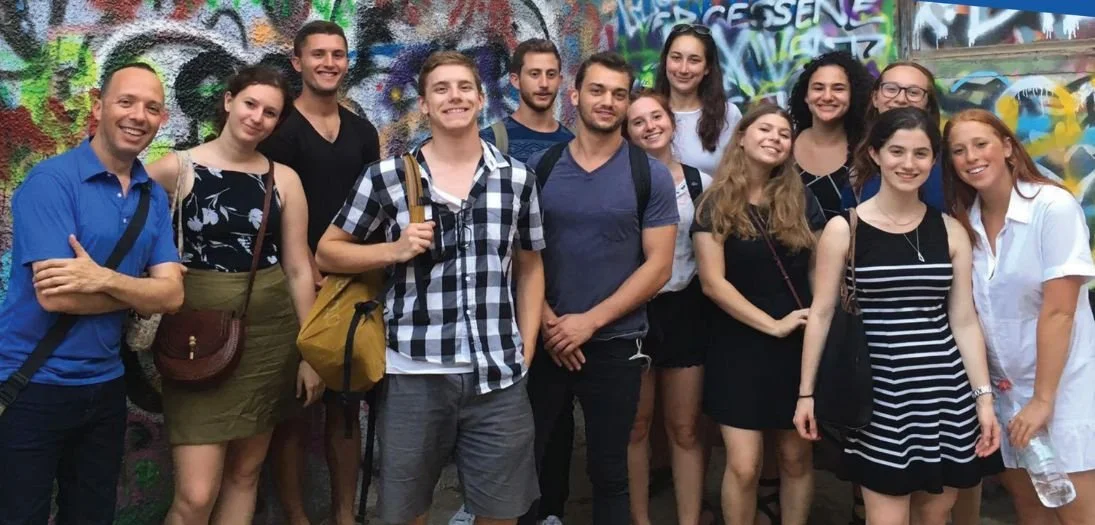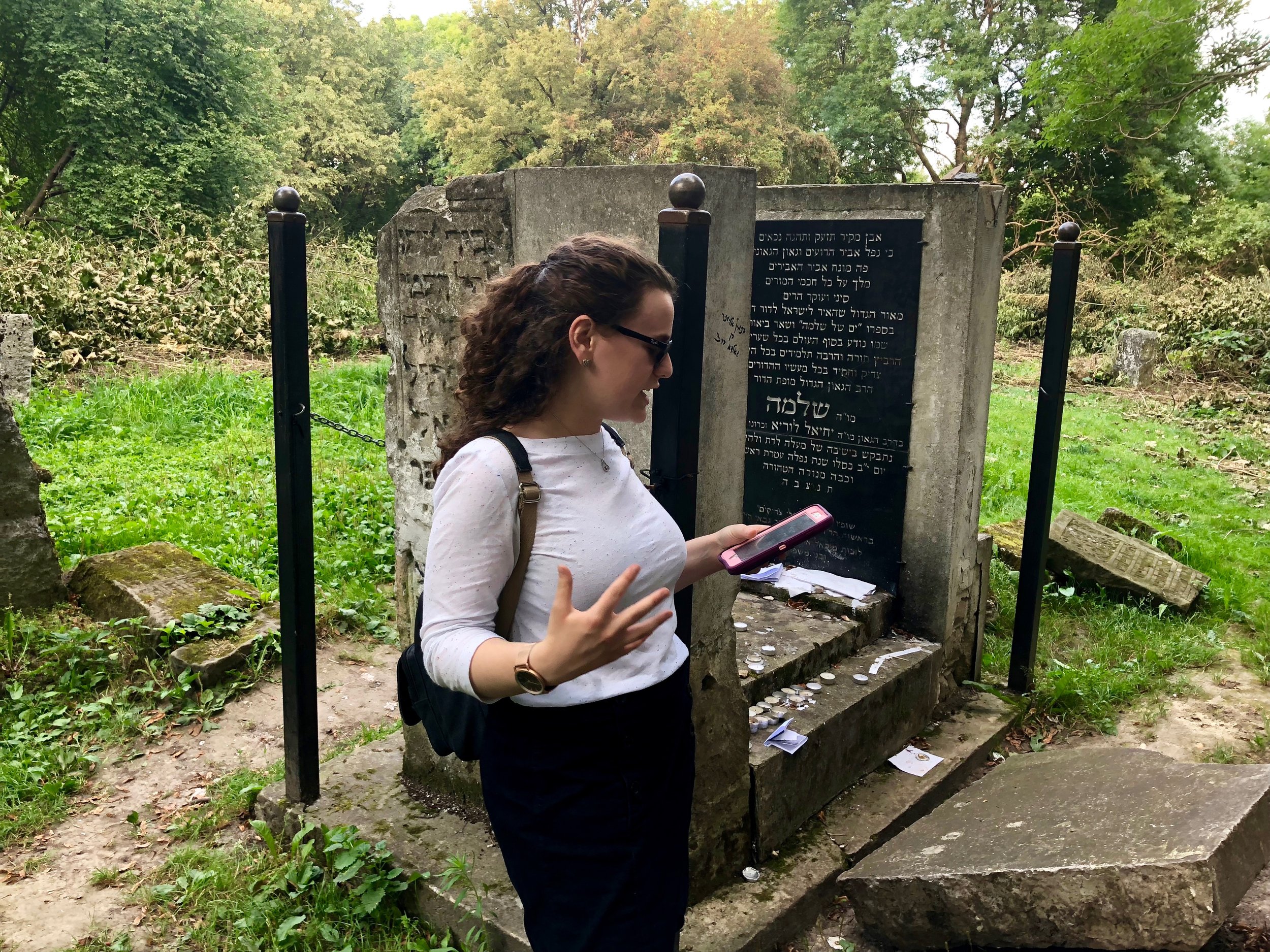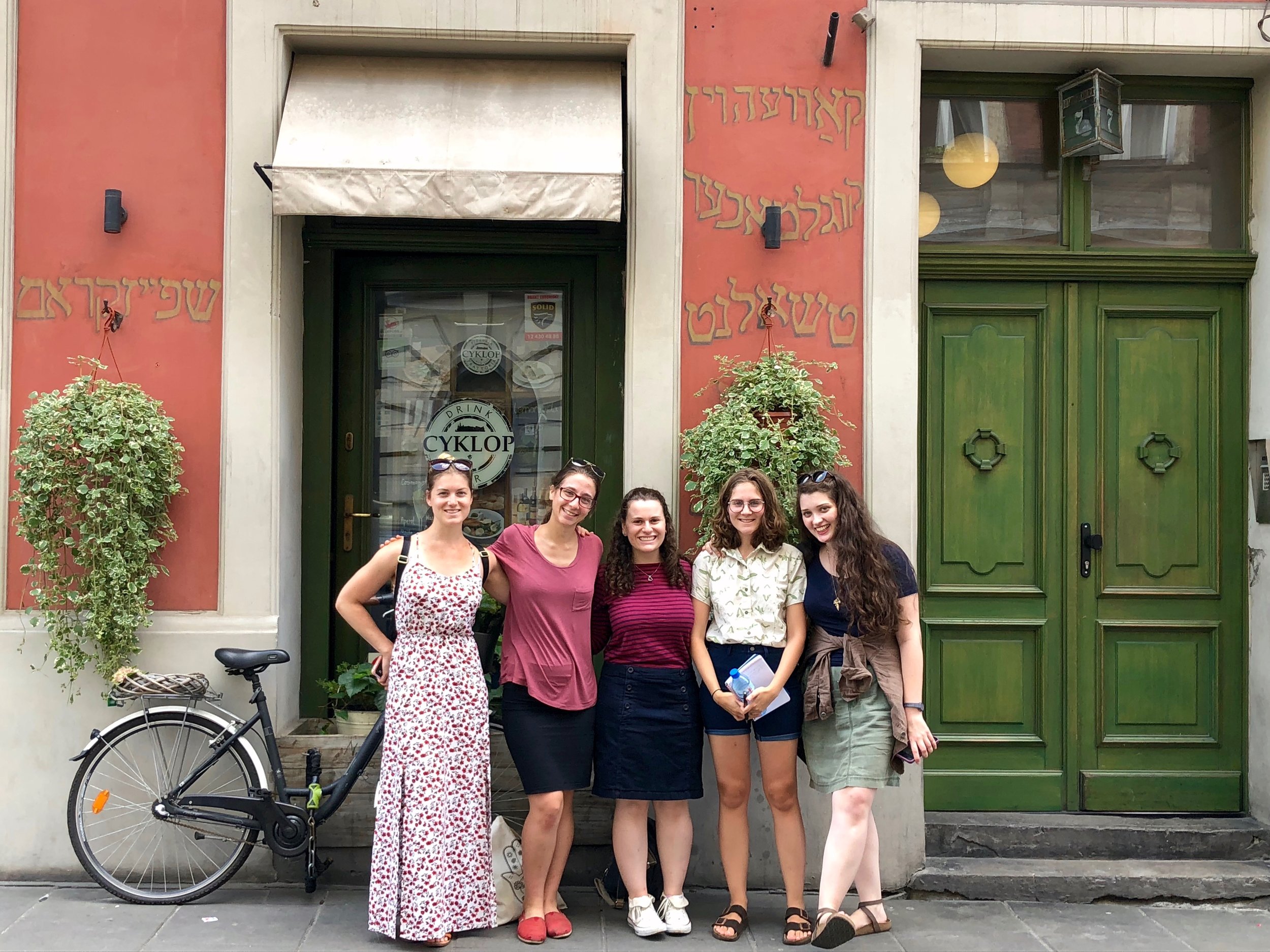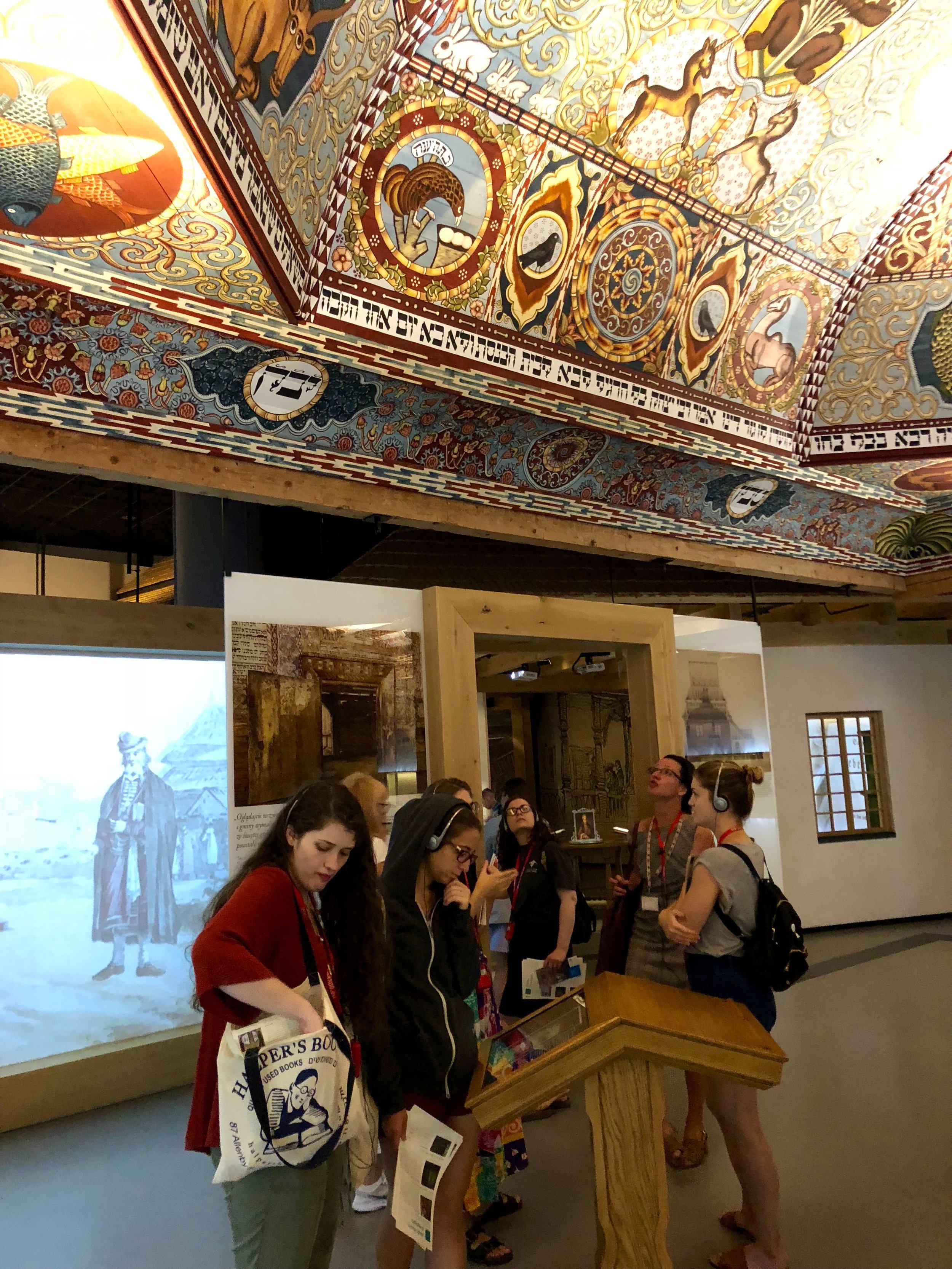The IIJS Undergraduate Fellowship - Spring 2026
The Institute for Israel and Jewish Studies is pleased to offer the IIJS Undergraduate Fellowship, an opportunity for students to deepen their academic experience and connect with peers across Columbia. This spring, Fellows will take part in invitation-only programs that explore Jewish and Israeli studies, history, and culture through thoughtful discussions and events featuring leading scholars and experts.
Fellows will receive an award in recognition of their participation, with funding distributed after successful completion of the fellowship.
Applications are due by Friday, October 17, 2025. Undergraduates in Columbia College, Barnard College, the School of General Studies, and Columbia Engineering who will be on campus in Spring 2026 are welcome to apply. Previous fellows are encouraged to apply; however, first-time applicants will receive priority consideration.
IIJS Undergraduate fellows visit the Rare Book and Manuscript Library
Ready to take part? Download the application form via the button below or reach out to iijs@columbia.edu with any questions.
The IIJS Israel Fellowship
The Institute for Israel and Jewish Studies is delighted to offer a unique educational opportunity at Columbia University.
IIJS Israel Fellows awards fellowships in support of business or nonprofit-related internships, academic and/or research-based projects, immersive language programs, and/or university-offered courses during a summer in Israel. (Programs through religious institutions are not eligible.)
Students participate in a number of invitation-only educational opportunities to discuss matters related to Israeli politics, culture, and history during their summer in Israel and back on campus. Fellows participate in an evaluation survey upon return to campus and aid in recruitment for future Fellows.
To apply, complete the application linked here and email to iijs@columbia.edu. Please note, UTRC approval is a required component of the fellowship application.
Columbia-sponsored travel to Israel is reviewed on a case-by-case basis. Students planning to travel must submit a draft itinerary for approval by the Undergraduate Travel Review Committee (UTRC), ISOS, and their dean as part of the fellowship application process.
Applications will not be considered, and travel cannot be funded, without approved UTRC travel authorization. Instructions for completing the UTRC application are linked here.
Questions regarding the UTRC approval process should be directed to utrc@columbia.edu.
Applications are due by Monday, February 16, 2026.
Naomi Prawer Kadar Fellowship
What is the Naomi Prawer Kadar Fellowship?
The Naomi Prawer Kadar Fellowship is an excellent opportunity to enhance your Yiddish studies at Columbia through a Yiddish Study Abroad Program. The Naomi Fellowship includes participation in the Naomi Prawer Kadar International Yiddish Summer Program at Tel Aviv University in the summer of 2026 and in the “Exploring Yiddishland” study trip, led by a Columbia faculty member. Previous “Exploring Yiddishland” trips have taken students to Poland and Argentina.
When?
Exploring Yiddishland in Poland, June 25-July 2, 2026; Naomi Prawer Kadar Yiddish Summer Program at Tel Aviv University, July 5-30, 2026.
What is included?
The 2026 Naomi Fellowship includes tuition for an intensive four-week-long for-credit Yiddish language and literature course (80 course, 4 credits); a travel grant; housing at Tel Aviv University; travel, accommodation, and programming during the "Exploring Yiddishland" study trip. All other expenses are the responsibility of the student. The Fellowship requires full participation in both components of the program.
Who is eligible to apply?
This fellowship is open to CC, Barnard, GS, SEAS, SOA, SIPA, TC, JTS, and GSAS students who have maintained an overall 3.0 GPA and who by May 2026 will have completed at least 4 credit points in Yiddish language courses in Columbia Yiddish language program with a grade of “B” or higher. These four points (or more) must include at least one of the following courses:
UN1101-UN1102 Elementary Yiddish I and II
UN2101-UN2102 Intermediate Yiddish I and II
Please note Yiddish literature classes (in translation) and Yiddish for Academic Purposes cannot be counted as part of the required 4 points.
How many spots are there?
There are up to 6 fellowship spots for Summer 2026.
Can I receive credit?
Yes. In order to obtain academic credit (4pts Yiddish II, Yiddish III, or 3pts for Yiddish IV or V) for the Naomi Prawer Kadar International Yiddish Summer Program, students need to 1) submit Tel Aviv University transcript for the course; 2) score accordingly on Columbia’s placement exam; and 3) complete the next higher level of Yiddish language class(es) with at least a grade of B+. All awardees must complete the placement exam upon return to Columbia and before registering for Fall 2026 Columbia Yiddish classes; level of placement within Columbia’s language program depends on placement test results.
What do I have to do after the Fellowship?
Naomi Prawer Kadar Fellows are required to write three blog posts about their Naomi Prawer Kadar Fellowship experience for the website, take a language placement test, and must submit a written report for the Naomi Foundation in English, no later than September 1, 2026.
In addition, the Naomi Prawer Kadar Fellows must commit to at least three semesters of continuous Yiddish language instruction at Columbia: either two semesters before the summer program and one after, or one semester before the summer program and two after. Thus, the Naomi Prawer Kadar Fellowship will enable students to acquire points that can fulfill the Columbia language requirement and, additionally and significantly, can count toward a Concentration in Yiddish (21 points required) or Major in Yiddish (30 points).
How do I apply?
The Naomi Prawer Kadar Fellowship will be awarded based on academic achievement and Yiddish language aptitude. To apply, please submit:
1) Application
2) College transcript
3) Language evaluation from your current Yiddish language instructor
Deadline for completed applications is Friday, March 6, 2026. Applications must be submitted to iijs@columbia.edu.
Who sponsors the Fellowship?
The Fellowship is a program of the Institute for Israel and Jewish Studies, together with the Department of Germanic Languages. We thank the Naomi Foundation for their generous support of the Fellowship.
I still have questions…
Please contact iijs@columbia.edu.
What students have to say…
I was blown away! Every day presented a whole lot of new challenged as well as some routine remedies. I could definitely tell that my Yiddish was improving day by day, and it only made sense that it should. I was very pleased by the pace of learning as well and only gained excitement with more and more understanding. A nice benchmark for me was being able to understand a good amount of what was going on during the tour that we took in Bnei Brak, all in Yiddish of course. (Boaz, Summer 2019)
I had expected that participation in the Naomi Prawer Kadar Fellowship would reinforce my enthusiasm for Yiddish language and literature and reinvigorate my scholarly commitment to the field, but in fact it was more powerful—my affection for all things Yiddish has only intensified. (Elaine, Summer 2018)
There was something particularly exciting about a group of Yiddish students exploring the real Yiddishland together. The experience of reading Chelm stories on our way to the town of Chelm, or hearing a session on the significance of Krochmalna Street in Bashevis’ writing – and then walking down that very road – provided a context for the abundance of literature in which I am continuously immersed. (Pammy, Summer 2018)
My experience on the Naomi Prawer Kadar Fellowship has truly been a life changing one and has in fact done a lot to inspire my love of Yiddish. … Through the lens of the fellowship, where I got to meet Yiddishists from all over the world and learn why they studied this ever-changing language, I learned how complex the culture of this language really is. … The Naomi Prawer Kadar Fellowship offered me a ticket to be part of the community involved with studying and expanding Yiddish. (Eliana, Summer 2017)
My Fellowship experience was transformative for me because I got to see the potential of Jewish scholarship and museum work on an international level. There is so much history to preserve and remember and my trip to Poland only solidified my desire to be part of that work. For me, learning Yiddish – though rewarding on its own – was really about giving myself access to the documents and culture of my ancestors. That I got to learn the language in Israel only accentuated Yiddish’s profound and necessary impact on contemporary Jewry around the world. (Helyn, Summer 2017)





